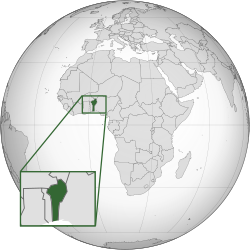Republic Of Dahomey
The Republic of Dahomey (French: République du Dahomey; pronounced ), simply known as Dahomey (Fon: Danhomè), was established on 4 December 1958, as a self-governing colony within the French Community.
Prior to attaining autonomy, it had been French Dahomey, part of the French Union. On 1 August 1960, it attained full independence from France.
Republic of Dahomey République du Dahomey (French) | |||||||||||
|---|---|---|---|---|---|---|---|---|---|---|---|
| 1958–1975 | |||||||||||
Motto:
Fraternity, Justice, Labour | |||||||||||
| Anthem: L'Aube nouvelle (French) "The Dawn of a New Day" | |||||||||||
 | |||||||||||
| Capital | Porto-Novo | ||||||||||
| Common languages | French, Yoruba, Fon | ||||||||||
| Government | Unitary one-party presidential republic (1960–1963, 1964–1965, 1968–1970) Unitary military dictatorship (1963–1964, 1965–1968, 1972–1975)
| ||||||||||
| Historical era | Cold War | ||||||||||
| 4 December 1958 | |||||||||||
| 1 August 1960 | |||||||||||
• Renamed | 30 November 1975 | ||||||||||
| Currency | CFA franc | ||||||||||
| |||||||||||
| Today part of | Benin | ||||||||||
In 1975, the country was renamed Benin after the Bight of Benin (which was in turn named after the Benin Empire which had its seat of power in Benin City, modern-day Nigeria), since "Benin" was deemed politically neutral for all ethnic groups in the state, whereas "Dahomey" recalled the Fon-dominated Kingdom of Dahomey.
History
The Republic of Dahomey became independent of France on 1 August 1960. In the words of the historian Martin Meredith, the young country "was encumbered with every imaginable difficulty: a small strip of territory jutting inland from the coast, it was crowded, insolvent and beset by tribal divisions, huge debts, unemployment, frequent strikes and an unending struggle for power between three rival political leaders". These rivals were Justin Ahomadégbé-Tomêtin, who held sway in the southern and central regions of the country, Sourou-Migan Apithy, who dominated the southeast, and Hubert Maga, whose power base was located in the north.
Upon independence, Maga became the first president of Dahomey. A political crisis in 1958, prior to independence, had led to Maga's Dahomeyan Democratic Movement joining a coalition government, with a subsequent crisis leading to Maga becoming the head of government in April 1959. This compromise, however, was unable to solve Dahomey's problems, and an uprising broke out in October 1963, culminating in a coup d'état, and the replacement of Maga as president with Apithy. This also failed to bring about stability, and Apithy was removed in another coup, in December 1965.
Following the 1965 coup, Colonel Christophe Soglo became president. A veteran of the French Army, he saw himself as a Dahomeyan Charles de Gaulle, banning all political activity with the stated aim of stabilising the country. Civilian rule was in fact restored in 1968, but the tumult of the preceding years meant that the army remained a key player in Dahomeyan politics, with civilian presidents beholden to their military backers. In October 1972, a coup (the fifth in the country's history) led by Mathieu Kérékou removed a civilian government (which had been headed by a triumvirate consisting of Ahomadégbé, Apithy and Maga). Kérékou would go on to proclaim his support for Marxism–Leninism, declaring the end of the Republic of Dahomey and the establishment of the People's Republic of Benin on 30 November 1975.
In film
Dahomey was chosen for some of the filming locations in the 1967 film The Comedians, with an all-star cast that included Richard Burton, Elizabeth Taylor, Lillian Gish, James Earl Jones, Roscoe Lee Browne, Alec Guinness, Raymond St. Jacques, Gloria Foster, Zakes Mokae, Paul Ford, Georg Stanford Brown, Peter Ustinov, Douta Seck and Cicely Tyson. The movie is the story of an adulterous affair, placed against the backdrop of Haiti during the tumultuous dictatorship of François Duvalier (known as Papa Doc). Dahomey resembled Haiti in many ways, both geographically and culturally, and it was safer to film there than in Haiti.
See also
References
- Decalo, Samuel (1990). Coups and Army Rule in Africa. Yale. ISBN 0300040458.
- Dickovick, J. Tyler (2014). Africa. Stryker-Post. ISBN 9781475812374.
- Meredith, Martin (2013). The State of Africa. Simon & Schuster. ISBN 9780857203885.
- Meredith, Martin (2014). The Fortunes of Africa. Simon & Schuster. ISBN 9781471135439.
- Post, Ken (1964). The New States of West Africa. Penguin.
- Time (3 February 1967). "On Location: The Green Shills of Africa". Time. Retrieved 7 September 2021.
This article uses material from the Wikipedia English article Republic of Dahomey, which is released under the Creative Commons Attribution-ShareAlike 3.0 license ("CC BY-SA 3.0"); additional terms may apply (view authors). Content is available under CC BY-SA 4.0 unless otherwise noted. Images, videos and audio are available under their respective licenses.
®Wikipedia is a registered trademark of the Wiki Foundation, Inc. Wiki English (DUHOCTRUNGQUOC.VN) is an independent company and has no affiliation with Wiki Foundation.


